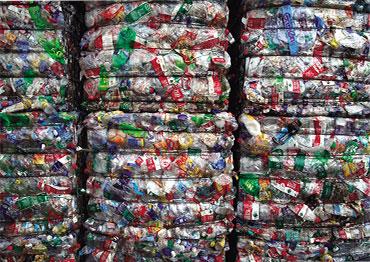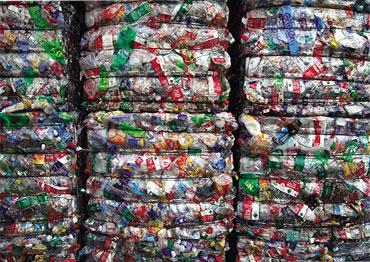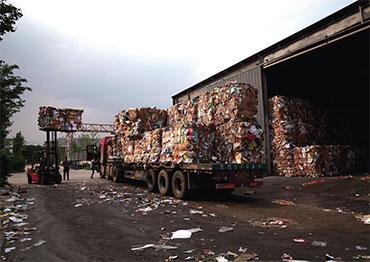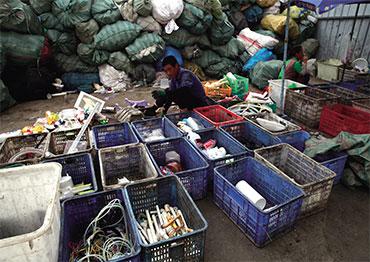Trash collectors have been the mainstay of the garbage recycling industry in China since the 1980s when the country began to embrace the market economy. But the large population, according to Zhang Jieying, a deputy researcher at the Chinese Academy of Social Sciences, is emblematic of “dual stigmatization.” She wrote in her 2016 book The Life of Waste that trash pickers are mostly migrants already on the fringes of urban society, and as they usually deal with garbage on the edges of cities, they are further stigmatized as “being dirty, mysterious and dangerous.”
For a long time, trash pickers were marginalized and remain outside any formal management system. They are a source of trouble for city officials. In a 2009 interview with the China Youth Daily, Wang Weiping, the Beijing government advisor, claimed that trash pickers in Beijing were involved in 72 percent of criminal cases and 72 percent of them have had infectious diseases.
“They fight for territory, and the bosses of some trash picker gangs have even hired thugs. It causes public safety issues,” he said. “They are a population outside the public’s and government’s sight,” he added.
Zhang said that many trash pickers and illegal dumps dispose of garbage without any pollution controls, harming the environment.
In 2011, the State Council issued a document on establishing advanced waste processing and recycling systems, encouraging small- and medium-sized enterprises to engage in garbage disposal, and demanding standardized management for individual trash collectors.
In 2016, the State Council issued another document on upgrades for waste recycling, which called to make full use of smaller recycling enterprises and individual trash collectors.
These documents, however, were mostly ignored. In a 2020 report on trash pickers before and after the country rolled out compulsory garbage classification and sorting measures, Chinese data analyst Dataway pointed out that current measures in cities generally target residents, communities and sanitation workers but overlook individual trash collectors and the illegal recycling industry.
Many local governments simply banned or restricted individual collectors. Beijing issued a regulation on the management of household garbage this year that requires communities to stop trash pickers from sorting and mixing already classified garbage.
Both Qi and Wu told NewsChina that the people in charge of their community or street have warned they might not be able to collect garbage in the future.
In March 2020, Yang Xuefeng, a professor at Zhejiang University of Finance and Economics, claimed in an article for Economic Information Daily that trash picking is not the same as garbage classification. “Garbage classification refers to dropping, collecting, transporting and disposing of garbage according to different classifications, while trash picking is merely a means of making money, and trash pickers make no contribution to raising public awareness [of garbage sorting and recycling],” he wrote.
Wang Weiping disagrees. “We can sort garbage by weight using density blowers or magnets to sort out metallic waste, but no current technology can do the work more carefully and effectively than people doing it by hand,” he said. “Even developed countries like the US still have manual sorting.”
Zhang Jieying wrote in her book The Life of Waste that trash pickers play a major role in garbage disposal, especially when it is hard to get households to sort and recycle their own trash. Trash picking offers a means to earn a living, especially during the recent economic slowdown.
Wang Weiping said that in Beijing, trash collectors processed as much garbage as government garbage disposal plants, around 7.6 million tons based on 2016 data. If it costs 500 yuan (US$74) to process a ton of garbage, trash pickers reduce government expenditure for disposal by 3.8 billion yuan (US$558.8m) every year.
Furthermore, trash pickers are good at what they do. A community in Shanghai, for example, reportedly employed an experienced trash picker to help residents sort household waste when the city rolled out compulsory household waste sorting in 2019.
Wang Weiping and Zhang Jieying suggest that local governments should not ban trash collectors. In 2018 during the Two Sessions, China’s annual top legislative meetings, Song Lianghua, a member of the Sichuan Provincial People’s Political Consultative Conference, proposed including China’s army of trash pickers into the official urban garbage sorting and recycling system.
“I’ve done a lot of research into how other countries deal with trash pickers... I think we can learn from Brazil, for example, where pickers take responsibility for garbage sorting and the government sets up cooperatives [to aid them]. This costs less and has much higher social and economic returns,” Song told the Sichuan Daily.

 Old Version
Old Version


